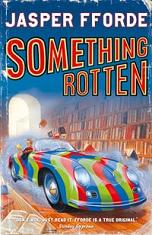(I wrote this last year and had always intended to come back to it, but I never did, until Nicholas reviewed Harlan Ellison’s Deathbird Stories and reminded me of this again.)
It was Kip’s post on Harlan Ellison and his trademarked name that reminded me of Ellison’s celebrated short story “Jeffty is Five”, which I had also just reread it again, so it was fresh in memory anyway.
I must’ve read “Jeffty is Five” about a dozen times by now; it’s a well anthologised story, winner of both the Nebula and the Hugo award. The first time I read it, some twenty years ago or so, I quite liked it, but over time I’ve become more and more uncomfortable with it.
As the Wikipedia summary puts it, “Jeffty is Five” “tells the story of a boy who never grows past the age of five physically or mentally. The narrator, Jeffty’s friend from the age of five well into adulthood, discovers that Jeffty’s radio plays serial programs no longer produced on radio stations that no longer exist. They are contemporary, all-new shows, however; not re-runs. He can buy comics such as The Shadow and Doc Savage that are, again, all-new although they are no longer being produced. The narrator is privy to this world because of Jeffty’s trust, while the rest of the world (the world that grew as Jeffty did not) is not.”
In the story, trust and nostalgia are inseperatable. The narrator gains access to Jeffty’s golden childhood world because he has Jeffty’s trust and looses it in the climax of the story by inadvertently betraying this trust. At the start of the story the narrator is out in the cold, untrusting world of seventies America, at the end he’s there again, but made even worse by knowing what he has lost.
As a story, it is a powerful dose of nostalgia, a paean to Ellison’s own lost childhood and the wonders it held, even for people who never experienced this time themselves. There’s always been a stubborn streak of nostalgia in science fiction, an awareness of history to which this story appealed; as its long list of awards shows. It also fits well with the general trend for nostalgia of the late seventies —happy Days, anyone?
Now in general, nostalgia is a reactionary emotion, not just a hankering for an idealised past and a denial of the present, but also a denial of possible future improvement. In small doses this is harmless, but when it controls a discourse, it can be a prelude to authoritarianism. Which is why I’m skeptical of nostalgia these days, especially as seductive as it is presented here. Ellison is quite convincing in his genuine love for nineteenforties pop culture, but unfortunately, this love is stuck in the middle of a quite amoral tale. Let me explain what I mean by that.
First, there’s the treatment of Jeffty’s parents, who are depicted without any sympathy for their plight, as dour, soulles, crushed people with no notion what their son can do, or appreciation of him. Both physically and mentally they’re repulsive. They have to be repulsive and unsympathetic for the story to work, to make the real world that much more dismal, but also because if the narrator felt any real sympathy for them, his joy in sharing Jeffty’s world with him could not be so innocent.
Then there’s Jeffty himself, whose condition is treated as not just positive, but as a wonder, something to envy. Again, this needs to be done to make the story work, but if you think about it, would you want him to stay five forever, or would you want him to grow up?
Finally, there’s the narrator’s treatment of Jeffty, which is nothing short of exploitative. In the heart of the story, when he recounts his time with Jeffty, “the happiest time of my life”, it’s all about him listening to new installments of his old favourite radio shows, seeing his favourite movie stars making new movies of his favourite novels, reading his favourite comics and pulps; you get the picture. It’s all about his pleasure in material things, justified through the lens of sickly nostalgia. (His hatred for contemporary America is also rooted in material matters: rock music, cheap candy bars, junkfood.)
This is why, though I loved this story when I first read it years ago, I’ve found it less and less charming everytime I’ve reread it. It’s well written, but it’s wrong.
